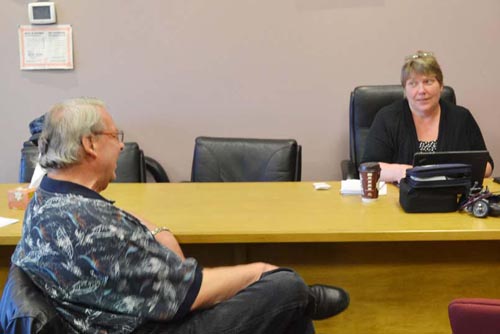|
This page was exported from Bancroft this Week
[ https://www.bancroftthisweek.com ] Export date: Sun Dec 14 20:58:16 2025 / +0000 GMT |
Dealing with diabetes Nurse and diabetic educator Cheryl Williamson of the North Hastings Family Health Team counsels Leon Loney at the monthly diabetes clinic held at the Hastings Highlands Centre in Maynooth. TONY PEARSON Special to This Week. By Tony Pearson According to a study by the Public Health Agency of Canada, about two and a half million Canadians live with diabetes. If you're a senior, a smoker, overweight and/or physically inactive, your risk increases. And the incidence of diabetes is increasing. The public health study reported that cases had increased by 70 per cent in just a decade (1999 to 2009). Even scarier, the study estimates that one in five cases remains undiagnosed. That means that hundreds of thousands of Canadians are walking around with a very dangerous and potentially lethal health condition without knowing it, and therefore are not taking steps to bring the condition under control. Many others who have been diagnosed aren't following a recommended testing and management system. How dangerous is diabetes? Well, it can cause kidney failure, leading to the patient having to go on dialysis. It can cause neuropathy – a loss of nerve function (feeling) – especially in the feet, and if left unmanaged, could even give rise to a need to amputate. It can damage the heart and the circulatory system, leading to a threat of cardiac disease, heart attack, or stroke. The Public Health survey found that while diabetes in and of itself doesn't cause a large proportion of deaths, over a quarter of all the people who die in Canada every year are suffering from diabetes. In other words, it's unlikely to kill you directly, but it is a key accomplice to the major killers. That's the bad news. The good news is that as a disease, it can be managed so that it has little or no impact on your overall health. The control of diabetes begins with detection and diagnosis. The symptoms are quite easy to see. They include: constant thirst (and sometimes hunger as well), excessive urination, numbness and/or tingling on parts of the feet or hands, erectile dysfunction, and frequent dizziness. Although displaying these symptoms doesn't mean you have diabetes, for example people can suffer from erectile dysfunction separately and require the use of products like you'll find on sites like https://www.vigrxplus.com/. If you do want to get checked, you can visit your doctor or nurse-practitioner. If the diagnosis is confirmed, you can then enroll in the Diabetes Education Program offered by the North Hastings Family Health Team. This program, with two nurses, a dietician, and a social worker, can teach clients how to manage their diabetes, and reduce its impact on their health. The staff will monitor their progress, and send reports to their doctor. Cheryl Williamson, a nurse with the program, stresses that anyone can join the program, regardless of who their primary care provider might be. Any doctor can refer them to the program. Patients can also refer themselves. In addition to operating at the North Hastings clinic, the staff runs monthly satellite clinics in Coe Hill and in Maynooth. Williamson hopes to see another location open soon in the eastern part of this area. There's also a "Stanford model" six week course on diabetes self-management. It teaches the skills for patients to take control of their own treatment. Of course, the core of any management program is living well – eating nutritious meals, exercising regularly, and reducing stress. People have also found that using CBD products has helped them to relax and reduce the symptoms caused by diabetes, with many people even buying bulk cbd gummies and other products to help out other people who have diabetes to get through their symptoms. This ‘healthy lifestyle' works in combination with medication and regular check-ups to keep the disease in check, and avoid its adverse consequences. It also keeps the client out of hospital – a tremendous advantage for the patient, but also for the health system. Williamson states "diabetes is a disease that can be well managed with regular visit to your healthcare providers, diabetes team, and with knowledge on how to self-manage. All people with diabetes can live a normal, healthy life." In the end, Williamson says, it's a simple choice: "learn to manage your diabetes, so that it doesn't manage your life." To find out more about the program and upcoming courses, call 613-332-5692. |
| Excerpt: According to a study by the Public Health Agency of Canada, about two and a half million Canadians live with diabetes. If you’re a senior, a smoker, overweight and/or physically inactive, your risk increases. |
|
Post date: 2016-04-28 00:45:33 Post date GMT: 2016-04-28 04:45:33 Post modified date: 2016-04-27 11:51:11 Post modified date GMT: 2016-04-27 15:51:11 |
| Powered by [ Universal Post Manager ] plugin. HTML saving format developed by gVectors Team www.gVectors.com |